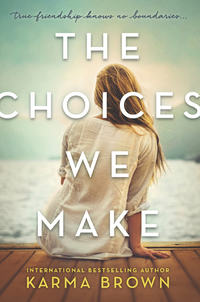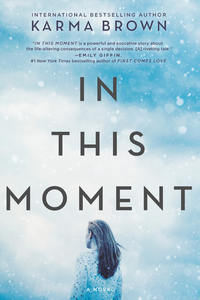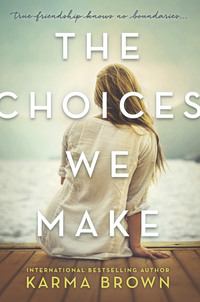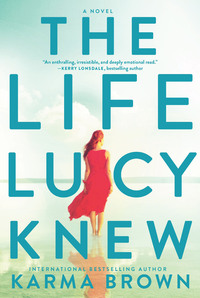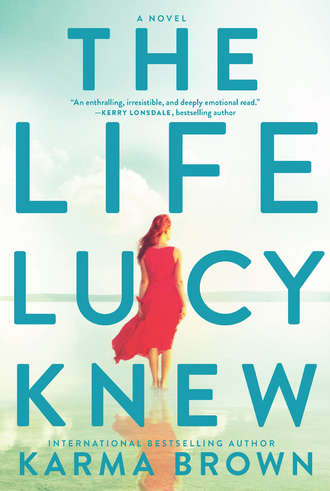
Полная версия
The Life Lucy Knew
“Stop it, Alex,” I said, waiting for her to admit she was messing with me, which was certainly offside considering the situation but not out of the realm of normal for our sisterly relationship. “Why are you lying to me? And where are my rings? Mom, please give them back. The nurse said you have them.”
“There are no rings, love.” Mom’s voice was barely a whisper. She’d done some crying before she came back into my room, telltale red splotches under her eyes and on her neck that hadn’t yet had time to fade. “There are no rings.” My dad stood quietly beside my mom, nodding and solemn.
Alex said it again, stone-faced, the bravest of the bunch. “Daniel is not your husband, and Matt is your boyfriend, Luce. You’ve been living together for two years, in a condo in Leslieville—which I think you pay way too much rent for, PS.”
“This is crazy.” I lay back against my pillow. My breathing was erratic, my heart pounding hard enough an alarm beeped on the monitor attached to me. Everyone looked at the screen, then back at me with concern. “How can I be with Matt? I’m married. To Daniel.” If I kept saying it, maybe it would turn out to be true.
The plastic bracelet itched my skin, and I tugged at it with my other hand. Seeing the name Sparks so clearly typed across it made me nauseated. I had to be dreaming. But when I pinched the skin on my wrist—hard—it hurt and felt all too real. “Daniel is my husband. We got married a year ago! You were all there.”
“No, honey. We weren’t.” Mom grabbed my shaking hand and squeezed softly. “You have never been married. To Daniel, or anyone.”
And then I’d lost my breath—it left me in a long wheeze and I had a hard time getting it back, even with the nasal cannula streaming pure oxygen up my nose. This wasn’t a joke, or a dream. They were not lying to me.
Later my parents brought proof. Photo albums with pictures of Matt and me together—wearing matching ugly Christmas sweaters for my best friend Jenny’s annual holiday party; on a boat in Mexico during some beach vacation, head to toe in scuba gear; holding up plastic cups of beer at a hockey game.
But Matt can’t be my boyfriend, I’d whispered again. And then once more in case I was too quiet the first time. Matt and I worked at Jameson Porter, a Toronto-based consulting company with impressive clients and a better-than-most corporate culture. It was full of young, highly motivated types looking to climb ladders quickly, and I’d been there for nearly four years. Matt was a business consultant, while I worked in communications, as the director managing the firm’s many press releases, industry reports and memos. We often grabbed lunch when Matt wasn’t traveling and joined our coworkers frequently for after-hours drinks at nearby watering holes.
“That’s the Matt I remember.” I squeezed my eyes shut and clutched the photo album to my chest. It made me feel sick to look at the pictures.
“Well, that Matt? Your work friend Matt? He’s also your Matt,” Alex said.
“But...but what about Daniel?” A crushing sense of loss crashed into me. “What happened with Daniel?”
And why could I remember him sliding a wedding band over my finger? Dancing to Harry Connick Jr.’s “Recipe for Love” for our first song as husband and wife. His hand on mine as we cut into our wedding cake—vanilla with lemon curd. What about the memory of him tripping, and us collapsing in a fit of laughter, as he attempted to carry me over the threshold of our Leslieville condo? How did I have all these memories of us together when apparently none of them had ever happened?
No one could explain it. They weren’t even sure where to start, except to acknowledge that obviously something was very (very) wrong inside my head.
“Honey, you and Daniel were engaged. But then you broke it off, oh, about four years ago now,” Mom said. “Is that right, Hugh?” Dad confirmed it was. Alex nodded. They looked as distraught to be giving me this history lesson of my life as I was to be receiving it.
“Four years ago?” They all nodded again.
Defeated, I pressed my fingers to my eyes to try to stop the tears. I’d never been more scared, and even with my family gathered tightly around me, I’d also never felt more alone.
* * *
“It’s called ‘confabulated memory disorder,’” my neurologist, Dr. Alvin Mulder, said, his white-coated arms crossed over my chart, which he held tight against his body like a shield. “It’s not uncommon in head injury cases.”
Does “not uncommon” mean “somewhat common”? I wondered as I took in his words. Or does it mean “rather unusual, but not exactly rare”? Not that it mattered. The answer wouldn’t change anything, couldn’t fix anything.
After I had asked where Daniel was, causing Matt to throw up with shock and Mom and Dad to insist on more tests, everyone realized things weren’t quite right with my memory. Obviously. But it wasn’t only amnesia we were dealing with; it was something altogether scarier. Dr. Mulder confirmed while my physical injury had mostly healed, it appeared there were some “deficits.” And these deficits may be long-term, he added, which caused Mom to slap a hand to her chest, her mouth open in a perfectly round circle. “How long-term is long-term?” she asked.
“Well, permanent might be a better way to think about it,” Dr. Mulder said, and I felt a jolt inside me.
“Permanent?” Mom echoed, her hand now on her neck, her fingers rubbing the skin there with apprehension. “I see.”
I didn’t see at all. All I had done was hit my head on some ice. And now I might be stuck with this mismatched memory permanently?
“I prefer the term false memories to confabulations,” Dr. Theodore Talcott, the hospital psychiatrist on my case, said. I glanced at him, careful not to turn my head too fast and set off a pounding headache, and he gave me a kind smile behind a trim, graying beard. “Your brain wasn’t creating new memories when you were in the coma and our brains don’t care for empty spaces, so it filled in the blanks.”
He tucked his hands into his pockets, rocked back on his heels, now made eye contact with my parents. “And sometimes, like in Lucy’s case, these gaps in the memory get filled with a combination of new and old information—which is why some of what you’re remembering is accurate, while other things are not.”
“Like her marriage,” Mom said, still working away at the skin on her neck, now red and angry looking. “Dr. Talcott, you should know she’s still having a very hard time believing it isn’t real.”
“Mom, please.” I hated that she brought it up with the doctors again, even though it was clinically relevant. That she was talking to them as though I wasn’t in the room, like grown-ups discussing their child’s invisible friend in her presence. Voices a little too upbeat and encouraging, yet laced with trepidation.
“Please, call me Ted,” Dr. Talcott said. My mom nodded, though I knew she would do no such thing because this was a case when formality mattered. “Ted” would most certainly not have the answers we needed, but “Dr. Talcott” just might.
“The thing with false memories that is so fascinating—so fascinating—is how real they seem to the patient experiencing them,” Dr. Talcott continued, excitement filling his voice. He’d admitted to us earlier I was only his second false-memory patient—the first an elderly man who’d had a stroke and woken up believing he had won an Olympic gold medal in pole-vaulting at the 1948 London games. However, according to this man’s wife, while he had been a pole-vaulter that year, he had failed to qualify for the Olympic team. “False-memory patients can recount incredibly detailed descriptions of the event they’ve invented. It’s fascinating.”
Mom scowled at his mention of this being “fascinating” three times in one breath. Because to us this was anything but—it was terrifying. Devastating, even. Especially when the doctors said they had no way of knowing if the hidden memories would reveal themselves, and if these false ones would eventually disappear when my brain reset.
“So what can we do?” Dad asked. “About these false memories? Is there some sort of treatment? Or medication? Whatever she needs.” He rested a hand on my shoulder. “Anything she needs.”
Dr. Mulder shrugged his shoulders, my chart still stuck to his chest. “Brain injuries aren’t like broken bones. They don’t heal with predictable patterns, and unfortunately there’s little medically we can do.” Dad smiled at me and rubbed my shoulder. I didn’t smile back.
“Based on how things look right now, there’s a good chance you’ll have some postconcussive symptoms, like headaches and mild dizziness, and those we can treat with medication. Though we expect those symptoms will alleviate with time,” Dr. Mulder said. “But as for the confabulation—as I said, there’s no magic pill, so to speak. Which is why Dr. Talcott is here. This condition is better treated with psychotherapy.”
“So, therapy is the answer here?” Dad asked.
“Yes,” Dr. Mulder replied.
Therapist Ted nodded, adding, “There’s great evidence therapy can help patients in these cases. But it’s a long process. As you can imagine, trying to reintegrate into a life that isn’t familiar can be a challenge.” He leaned on the rail at the end of the bed, and I noticed a wedding band on his finger. Shiny. I wondered if he was recently married, which made me think about Daniel. And Matt. I blinked hard and swallowed against the nausea that accompanied my pounding head. “However, the sooner you’re able to get back to your life, your routines, Lucy, the better.”
I didn’t want to do therapy, nor was I interested in this “long process.” I wanted to see Daniel, to have him comfort me and tell me everything was going to be okay. I wanted to apologize for missing our first wedding anniversary. And I desperately wanted—needed—everyone to stop looking at me like they expected more, like I was letting them down with every screwed-up memory I recounted.
But most of all I wanted to remember. To know the truth the way everyone else in my life seemed to. It was so easy for them to correct me, to gently explain the memories that felt so real were not, in fact, real at all. It was simple for them to be hopeful, because they weren’t inside my head where things were a jumbled mess.
If only getting things back to normal was as easy as going to a lost-and-found box, like we’d had in elementary school. A spot I could retrieve my memories like I might have a misplaced hat, or pair of sneakers, or my favorite pencil case. But it wasn’t going to be that easy, because according to the only two people in the room who had experience with this sort of thing, what had been lost might never be found.
4
One week later I was finally out of the hospital and desperate to get home. My parents had wanted me to stay with them initially, but I had balked at the idea, imagining the sort of hovering they would do if I moved back into my old bedroom. But even Therapist Ted had thought that sounded like a wise idea.
“This next while may feel like you’re speeding down a highway without the safety of your seat belt,” he’d said during his last visit as I was getting ready to be discharged. “Being in a familiar place, with the people you remember best, is likely a good transition strategy.”
“Our place will be familiar,” Matt had interjected before I could respond. But even with his confident (if not a bit hostile) tone, he looked worried as he said it. And fair enough. My memory was fuzzy, to put it mildly. There was a lot I didn’t remember and we were all on edge because of it.
Eventually my parents conceded, though they insisted on staying in our guest room for a while—at least until they were satisfied I wasn’t going to fall apart without them.
I do know this place, I thought with relief as we approached the front steps to the low-rise brick building in Leslieville, a short distance from Toronto’s downtown core. I could picture the buzzer pad that opened the front door, had no issue recalling the code. Once I walked into the building, I knew I had to go up a set of stairs, and then one more before reaching 2B, where I lived. When tested in the hospital on the wheres and whats of my current life, I had remembered the apartment and its location without trouble, had correctly described the high ceilings and exposed brick and great windows facing east so you could see the sun rise. But what I still didn’t remember? That Matt and I had lived in this place, together, for the past two years.
Climbing the last flight of stairs, my dad stayed close behind me, holding my elbow, his other hand pressed firmly to my lower back. As I unlocked my condo’s front door and walked through, my hand shaking with anticipation, I turned instinctually to drop my key into the silver dish on the hallway console. It was a small win, but an important one. I knew where I lived and where my key went, so I must belong here.
“Dad, I’m okay,” I said, because he still had his hand on my back. I was embarrassed by all the attention, like I was a kid again versus a twenty-eight-year-old who hadn’t needed her dad to help her do anything for more than a decade.
Still, I understood why my parents fussed. Why Matt’s eyes continued to dart my way, like he was waiting for me to collapse, or to break into a million pieces right there on our hardwood floor. Be forced to admit I’d forgotten yet another critical truth about my life.
“Of course you are, honey,” my dad responded, rubbing my back in tight little circles. I glanced over my shoulder at him and smiled, hoping it would help him relax. Mom busied herself with taking our coats and hanging them in our front closet, then announced she was going to put the kettle on. My mother felt a good cup of tea was the answer to nearly every situation, even this one.
“Here, let me take that for you,” Matt said, his face pinched and full of hurt I knew I was responsible for. He reached for my overnight bag, looking so tired—dark circles under his eyes, his lips dry and cracking when he tried to smile. I didn’t know this Matt, who stood in front of me in jeans and a sweatshirt, unlike the tailored suits I usually saw him in. The Matt Newman I had worked with for the past few years, who always seemed well rested, confident and ready to tackle whatever problem was thrown his way, was not this Matt Newman, who needed a haircut, looked like he might cry at any moment. Too thin for his frame, his jeans a bit baggy on his hips, like he hadn’t eaten a proper meal in weeks.
“Thanks,” I said, letting him take the bag I had insisted on carrying myself (“there’s nothing wrong with my arms”). I threw him a quick smile before he turned to walk into the bedroom. Though staying with my parents didn’t seem the right option, I hadn’t properly thought through what it would be like to come back here with Matt and the heavy weight of expectation.
As a result I was nervous around him, unsure about how to act and what to say and, quite specifically, where to sleep. My memory and my reality were at odds, in a battle it wasn’t yet clear could be won. Because despite the proclamations from my family and Matt—along with the undeniable photographic evidence on the walls, the “his and hers” sides of the closet, the clues sprinkled throughout the condo—that this was our place, my memory still told a different story.
And while I did remember I was in a relationship, that I was in love, I didn’t remember it being with Matt.
5
When I came out of the bedroom the next morning, Matt was already up. He sat on the couch reading a book, pillows and blankets folded beside him. I set the photo albums I’d taken to bed with me on the coffee table and gave Matt yet another forced smile. I had been doing that a lot in the past twenty-four hours.
My initial relief at remembering the condo had quickly given way to a series of awkward moments with Matt, culminating in a bizarre good-night incident when I went to bed. He had leaned in to give me a kiss on the cheek and I’d tried to give him a hug at the same time, which resulted in him kissing my nostril and us squishing uncomfortably into one another. We’d laughed, but it did little to cover how out of sync things were.
“Morning.” He smiled back, still looking as tired as he had the night before. “How did you sleep?”
“Pretty well,” I said, though the last time I’d glanced at the alarm clock it was after three in the morning.
“Glad to hear it.” He set the book down on his lap and I glanced guiltily at the stack of blankets beside him. While I couldn’t imagine sharing a bed with Matt, I suspected he couldn’t imagine not sharing one with me.
When I first lay down on our bed, I chose the left side. For one, that was where I always slept, and two, there was a small stack of folded T-shirts near the pillow on the right side. Then my head hit the pillow and the scent of Matt (a soap and citrus smell that was distinctly him) wafted into my nose. It took me a few minutes to realize I was on his pillow, on his side of the bed. But...but...the left side of the bed was mine, the right Daniel’s! However, it seemed Matt and I had the opposite arrangement, and I cried as I switched the pillows, though I stayed on the left side.
“I put the T-shirts you left out in the dresser. Hope that’s okay.” Being up half the night meant I had time to not only put Matt’s shirts away but also reorganize my clothes in the other half of the dresser. I also learned Matt rolled his socks and boxers, and kept his side of the closet much tidier than mine. “I didn’t want them to get wrinkled.”
That was an excuse—the T-shirts had zero wrinkle risk, the cotton so soft it seemed a crease would never be able to hold its shape. No, I had put the shirts away because they reminded me of the boyfriend I couldn’t remember who was sleeping on the couch right outside the bedroom door. Out of sight, out of mind.
Matt gave me a look I had a hard time deciphering. “Sorry. I probably should have left them. I thought—” I began.
He waved away the apology. “Totally fine. I, um... Actually, I had left them out for you.” He dog-eared the novel in his hands—folding over the bottom corner of the page—and smiled, but it did little to hide his pained expression. His fingers strummed the book’s cover in a relentless rhythm as he seemed to struggle with what to say next, finally shrugging before landing on, “You like to sleep in my T-shirts.”
“Oh.” A blush crept up my neck as I imagined Matt carefully choosing the shirts in anticipation of my homecoming, placing them just so on my side of the bed.
“It’s nothing. Don’t worry about it.” Matt smiled again, more convincingly this time, and stretched his arms high over his head. His T-shirt rose above his belly button, showcasing a toned stomach, and I averted my eyes. How could I explain it felt like cheating, being here with Matt, glancing at his bare stomach this early in the morning? None of this made any sense. A wave of vertigo hit me and I held tightly on to the back of a chair, hoping Matt wouldn’t notice. Why did I think this was a good idea, coming back here? I should have stayed with my parents.
“I turned the coffee on. Want a cup?” he asked, after what felt like an impossibly long and uncomfortable silence.
“Yes, definitely. But I can get it.”
“No, no, you sit.” He stood quickly, still in nursemaid mode, and I told him to relax.
“It’s just coffee, Matt. I’ve got it.”
“You’re sure? Okay, thanks.” He settled back onto the couch, turning on the television as though to prove everything was just fine. This was a perfectly normal morning for us.
I was relieved to find the mugs, as I remembered, lined up on one of the kitchen shelves. The faint sound of a newscaster’s voice made its way into our galley kitchen, even though Matt kept the volume low so as not to wake my parents. Matt was thoughtful. That I remembered well.
I glanced at the calendar tacked on the fridge while the coffee finished brewing. It was March already—it was still shocking to think I’d spent nearly all of February in a coma. So much time lost. Scanning the days, I saw Matt had a dentist appointment in two weeks and there was a thirtieth birthday party for someone named Jake (Jake from work?) at the end of the month. The rest of the days were blank, except for every Monday and Friday where someone—Matt, I assumed—had written in Lucy: Dr. Kay. Dr. Amanda Kay was the outpatient psychologist who was going to help me deal with the side effects of my head injury, with my “new normal.” I flipped ahead a few months, saw the many standing appointments and sighed wearily.
The coffeemaker beeped and I poured the hot liquid into the mugs, adding cream and a half teaspoon of sugar to both. It was only as I walked back into the living room that it occurred to me I wasn’t sure how Matt took his coffee.
Paralyzed by this realization, I stood still, the mugs clutched in my hands. I must have made Matt plenty of morning coffees over the past two years. But my memory failed to kick in, and when Matt shifted his gaze from the television to my statue-still stance, I gave up and asked, “How do you take your coffee?”
The wince was nearly imperceptible, but I caught it. “However you made it is fine,” he said. His eyes locked on mine as if hoping to convey this was the truth. But while I understood what he was trying to do, should have been grateful for it, the gesture made me angry.
“No, it isn’t fine,” I snapped. “Please tell me.”
He paused. “Black.”
I stared into the coffees, both of which were beige thanks to the pour of cream. “Right.” I turned back toward the kitchen and he was up a second later and following me.
“Honestly, I’m fine with however you made it. Lucy, wait.” He took the mugs with cream and sugar out of my hands and set them on the countertop. “It’s okay,” he said softly, pulling me to his chest. “This is all part of it. It’s okay.”
It should have been comforting, but our closeness felt unnatural. Matt was much taller than me (taller than Daniel) and we didn’t fit together easily. I wondered where I used to put my head when he hugged me—against his sternum, maybe? Because that was about where my cheek rested now. With Daniel it was between his neck and shoulder, right under his chin. “Don’t be upset,” Matt said again.
“I’m not upset.” I pressed my face into the soft fabric of his shirt, overcome by the hints of lemon and cedar and the warmth of him as I tried, unsuccessfully, to hide my crying. I didn’t remember being so emotional before my accident, but this head injury had left me with unruly and unpredictable mood swings. The doctors told me the moodiness would probably get better, but it might not, too. That had been their answer to everything. Your memory might resolve...or it might not. Your headaches will likely improve...but there’s a chance they won’t. Your brain is astonishing, will rewire as needed...but you may be left with a few holes, perhaps long-term. No one wanted to promise anything, which meant I also couldn’t count on anything. I was stuck waiting to see what happened along with everyone else.
I pulled back, stared into the face that was so familiar and yet not at all in this context. “I need to know these things, Matt. If I’m going to... I need to know—” I took a deep breath. “The truth. Even about how you take your coffee. It matters, okay?”
“Okay, Lucy.” He ran a thumb under my eyes before lifting the thin fabric of his shirt with his hand and using it to gently dry my cheeks. I was pretty sure he wanted to kiss me, his gaze lingering on my lips. My heart beat fast and the vertigo was back, making my socked feet unsteady under me, as though I was standing on a floating dock. Do I...want him to kiss me?
“You all right?” he asked, holding me tightly.
“Yes.” I wasn’t, and we both knew it, but he accepted this without argument. A moment later we separated, though I wasn’t sure who took a step back first. We leaned against the countertop, side by side, and Matt reached over for our coffees, handing me mine.
He grimaced after he swallowed his first sip, then laughed. “This is terrible.” I laughed, too, glad for the distraction.



